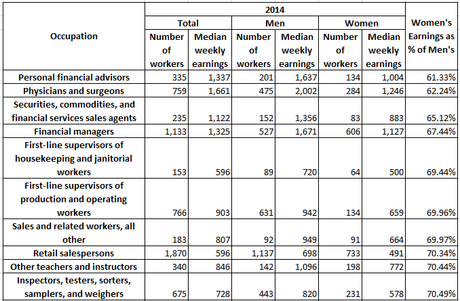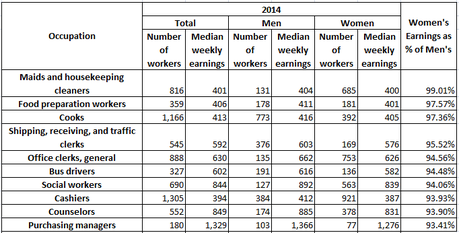
We *can* fight for wage equality.
As of 2014, women earn 82.55 percent of what men do in full-time wage and salary jobs. That’s a five percent increase from the 77 percent statistic often cited by the media and some clear progress towards gender equality.
Still, one has to ask: What’s keeping us from equal wages? Are 21st century employers still shortchanging women, or is there more to the pay gap picture than meets the eye?
To shed some light on these questions, let’s take a look at the numbers from the Bureau of Labor Statistics.

Source: Bureau of Labor Statistics
The Facts
In order to explain the pay gap, some argue that women earn less because they choose lower-paying jobs. If that’s the case, though, how is it that half of the jobs with the biggest pay gaps are white-collar ones – which, theoretically, should pay more?
Likewise, it’s telling that the jobs with the smallest pay gaps are some of the lowest-paying ones:

Source: Bureau of Labor Statistics
From these numbers alone, it seems women are caught between a rock and a hard place. If you want a white-collar job, you have to watch male peers take home larger paychecks. If you want equality, you have to settle with working at the lowest rungs of the ladder.
You might be thinking, “Okay, I’ve seen enough. Time to storm the streets!” Yes, we can do that – but not before trying to understand why those numbers exist.
The Reasons
Let’s start with the explained portion of the pay gap. Notice how, in the first table, many of the jobs are commission-based. This arrangement favors men, because our patriarchal society typically enables them to work longer hours and, therefore, close more sales. In contrast, women, who are expected to take care of their homes and families in addition to their professional careers, often for go the opportunity to earn more based on these duties.
Additionally, as one 2012 study shows, women are generally reluctant to negotiate their salaries. This study also notes that other factors — like geographic location and strength of community — contribute to the pay gap. Furthermore, women tend to pay themselves lower salaries even when they’re their own bosses.
These factors don’t fully explain why the pay gap persists even when men and women take the same long term careers after college. It doesn’t completely explain why the high-paying jobs have the highest pay gaps, whereas low-paying jobs have the lowest pay gaps.
Christianne Corbett, M.A., and Catherine Hill, Ph.D., authors of “Graduating to a Pay Gap: The Earnings of Women and Men One Year after College Graduation,” offer an answer to these lingering questions. “Experimental evidence confirms that many people continue to hold biases against women in the workplace, especially those who work in traditionally male fields,” they write. “Thus, there are solid reasons to believe that gender discrimination is a problem in the workplace.”
Unfortunately, clamping down on sexual discrimination won’t be so easy. “Discrimination is impossible to measure directly, and many who discriminate – both men and women – may not be aware that they are doing so,” say Corbett and Hill. In other words, even with the Lilly Ledbetter Fair Pay Restoration Act on your side, you’ll still have to prove that you’re being discriminated against.
The Action
Obviously, we can’t stay silent. It is time for women to defy gender stereotypes and speak up. It’s especially important for women in high school and college to be aware of what they can do to advocate for themselves before they enter the workforce. So, when you are presented with your first job offer, keeps these tips in mind:
- Negotiate Your Salary Once It’s Offered. Just because a number’s already written down on your job offer doesn’t mean you should stick with it. Since you’ve already proven yourself as a candidate during the interviews, you have the upper hand. As long as you know your worth, and are willing to employ some negotiating tips and tricks, there’s no reason to be afraid.
- Keep Negotiating Your Salary on the Job. If you won’t toot your own horn, no one else will. Make a paper trail of your achievements, and keep it handy when you approach your boss for a raise. Trust me: The guys are doing it when you’re not looking, so why can’t you?
- Take Advantage of Your Strengths as a Woman. You don’t need to be like a man in order to play a man’s game. Instead, you should hold yourself with confidence and value your role as a woman in the workplace.
Closing the pay gap won’t be an easy task. After all, we have to get around a ton of cultural expectations, internalized gender beliefs and life’s curveballs. If we keep pounding away, though, we can get through to the powers-that-be and finally get the fair treatment we deserve.

